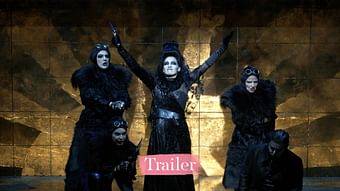"The Magic Flute" is a piece of collective cultural heritage and the most frequently performed opera in existence. Mozart’s universal opus is a fixture in the Vienna Volksoper’s repertoire.
Henry Mason’s new staging and the new musical interpretation by Anja Bihlmaier invite us to take a fresh look at the opera which we think we’re long familiar with.
Recommended from 9 years
Act One
The young prince Tamino is being pursued through an icy landscape by a perilous snake. He faints and is rescued in the nick of time by three belligerent ladies who slay the monster. As Tamino regains consciousness, he encounters the birdcatcher Papageno, who is in the service of the Queen of the Night, the ruler of this wasteland. The three ladies present Tamino with a likeness of Pamina, the Queen’s daughter who has been abducted by Sarastro. Tamino instantly falls in love with the likeness and promises the Queen that he will release her daughter from the hands of her mortal enemy. He sets forth on the journey together with Papageno. To aid them, Tamino receives a magic flute and Papageno a magic glockenspiel. In addition, three mysterious boys are entrusted to show them the way.
Papageno is sent ahead of Tamino and is first to reach Sarastro’s empire drenched in sun and heat, where he encounters Pamina. She is being hard-pressed by the sinister overseer Monostatos, but Papageno frightens him off and gains Pamina to his side. Meanwhile, the three boys have led Tamino to Sarastro’s temple, where a priest interrogates him about his mission. Guided by their enchanted instruments, all three adventurers try to find one another but get an abrupt surprise when Sarastro arrives. Pamina bravely takes on the feared ruler whilst Tamino is brought to Sarastro by Monostatos. The prince and princess recognise one another but are instantly separated, since Tamino and Papageno must undergo Sarastro’s trials.
Act Two
Sarastro wants to win Tamino over to his side and reveals to the priesthood that he has chosen Tamino for a higher purpose, and that Pamina is destined to be his wife. The trials commence with a commandment of silence, which proves especially challenging for Papageno. Though when the priests promise him a female companion who is his equal, he grumblingly agrees to apply himself to the task. Meanwhile, the Queen of the Night and her comrades-in-arms have invaded the temple. Remote controlled illusions of the three ladies ensnare Tamino and Papageno and attempt to win back their loyality to the Queen, whilst the latter instigates her daughter to an assassination attempt on Sarastro. However, Pamina‘s courage fails her and Monostatos tries to use her desperation to his advantage. But then Sarastro appears; he condemns all forms of deceit and vengeance, but is not free from his own ulterior motives.
Tamino and Papageno have further tough trials to face: an old woman appears to Papageno and wants to be his beloved, whilst Tamino’s resolute silence makes Pamina yearn for death. The prince’s steadfastness leads Sarastro to permit him to the final stage of his initiation, whilst Pamina now wants to bring her grief-stricken life to an end. Solely the three boys are able to save her from suicide and they lead her to her beloved. Together, Tamino and Pamina defy an apocalyptic vision of fire and water, violence and sorrow, and thereby pass all crucial trials.
The lonely, wandering Papageno continues to lose hope in finding the love he desires, but the three boys also come to his rescue and give him the vital clue he needs to find his longed-for Papagena. Monostatos has since switched his allegiance to the Queen and leads both her and her ladies to the heart of Sarastro’s sanctuary, but they are again overpowered. Both Sarastro and the Queen claim the truth for themselves till the bitter end – whether he wins or she loses. Their successors, however, are saved and, united, they look towards a self-determined future.
Cast
- Conductor
- Omer Meir Wellber
- Stage direction
- Henry Mason
- Stage and costume design
- Jan Meier
- Puppendesign und Coaching
- Rebekah Wild
- Choreography
- Francesc Abós
- Lighting design
- Guido Petzold
- Choir director
- Roger Díaz-Cajamarca
- Dramaturgy
- Magdalena Hoisbauer
- Sarastro
- Stefan Cerny
- Königin der Nacht
- Nofar Yacobi
- Tamino
- Jason Kim
- Pamina
- Rebecca Nelsen
- Erste Dame
- Julia Koci
- Zweite Dame
- Sofia Vinnik
- Dritte Dame
- Annely Peebo
- Monostatos
- Karl-Michael Ebner
- Papageno
- Daniel Schmutzhard
- Papagena
- Elisabeth Schwarz
- Sprecher / Zweiter Geharnischter
- Alexander Fritze
- Erster Priester
- Daniel Ohlenschläger
- Zweiter Priester
- David Sitka
- Erster Geharnischter
- Sebastian Reinthaller
- 3 Knaben
- Wiener Sängerknaben
Photos and Videos
For all those who use a screen reader, a description of the visual aspects of the performance (set design, costumes...) follows here instead of the photo gallery.

.jpg)
.jpg)
.jpg)
.jpg)
.jpg)
.jpg)
.jpg)
.jpg)
.jpg)
.jpg)
_edit.jpg)
.jpg)
.jpg)
_-_Kopie.jpg)
.jpg)
.jpg)
zuschnitt_1.jpg)